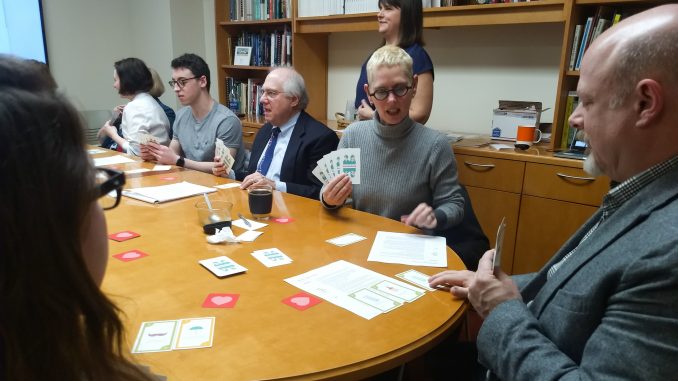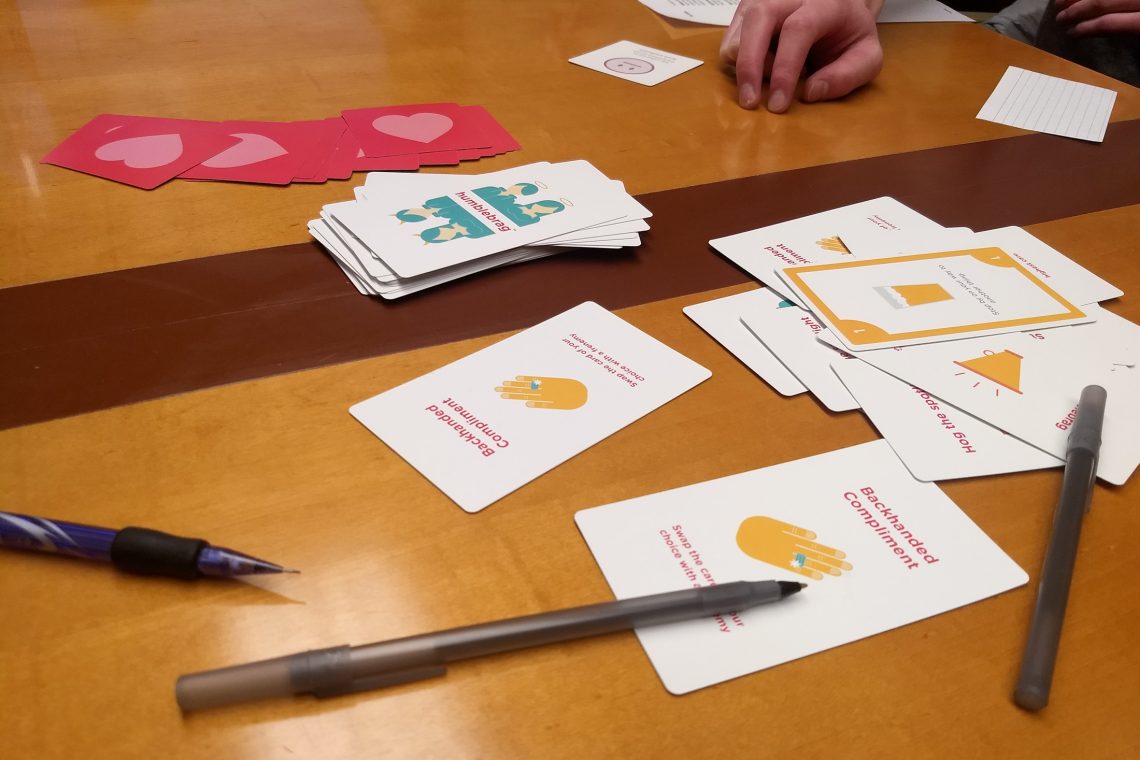
Mia Nardone looked through an array of cards in her hands during a game.
“I’m very competitive, so I’m playing to win,” said Nardone, an administrative department coordinator at Klein College of Media and Communication. Reaching a decision, she laid one card down — “Grow The Most Ironic Mustache,” worth 2 points — and smiled.
Nardone was one of a dozen students, faculty and staff who play-tested a prototype of the card game, titled “Humblebrag: The Game of Social Influence,” during a Feb. 19 presentation by creator Kathy Mueller, an assistant professor in the Department of Advertising and Public Relations.
In Mueller’s game, players jostled to gather the most “influence points.” The game ends when one player has five cards in front of them on the table.
Players earned points by playing ‘influence cards,’ which consisted of actions like “Charm them all with your childhood photo” or “Check-in at the gym. BONUS: Take a selfie in your workout clothes.”

At the end of the game, each player was dealt one of five ‘chance cards,’ which can totally clear, double or add to or subtract from the player’s collected points. It can also change the outcome of the hand.
Mueller, a 2014 graphic design MFA alumna, said she intended the game to not only be fun but also encourage players to think critically about social media culture.
Mueller said the chance cards’ ability to disrupt a player’s plans is meant to remind players of the volatility of the internet “influence” they’re building throughout the game — players can do everything right and still lose due to the vagaries of chance.
“I tried to use the cards to represent behaviors,” Mueller said. “My hope is that by taking them out of the digital experience and putting them into the physical space in the form of a playing card, it exposes some of their frivolous nature.”
Mueller has presented her game at the “Looking Good 20/20,” a multimedia exhibit at Florida Atlantic University about examining social media, and to graphic design students at West Chester University.
Copies of the game will be available to Temple students in the atrium of Annenberg Hall and the game collection at Charles Library, Mueller said.
Nardone, who did not ultimately win any rounds, said she found the game funny and she could relate to the humor of the cards as a millennial.
“I don’t know how much an older generation relates to them, but I feel like they definitely can learn something from this,” she added.
Steven Aronow, a senior music production major, played two rounds of the game. He enjoyed the game but had a minor critique.
“I think the humor could have been a little more personal, you know?” he said. “It could have made me feel a little more embarrassed or something, which would have made it a little more funny to me.”
Securing publication and distribution for the game was difficult, Mueller said, because of the competitive nature of the card games market.
The game began as a project for a graduate-level graphic design course while she was at Tyler, Mueller said. She was inspired by her own experiences with sites like Facebook, Twitter, and Instagram and the discourse at the time around the pros and cons of social media
She named the game after a con she observed, “humblebragging,” a phenomenon where social media users post what appears to elicit sympathy, with the subtle intention of showing off their virtues or talents.
The term was coined by comedian Harris Wittel in 2010. Wittel then popularized the term via a now-defunct Twitter account, @humblebrag, where he tweeted out examples of the phenomenon to thousands of followers.
Although the game satirizes humblebragging and other less positive aspects of social media, Mueller said she didn’t want the game to be misunderstood as an argument that people should opt-out of networks like Facebook or Instagram.
“This is the future, this is today, we can’t go back,” Mueller said. “All I’m suggesting is, let’s see it for what it is while we participate in it.”


Be the first to comment